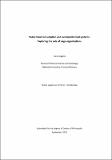| dc.description.abstract | Sustainable food is increasingly recognised for its potential to contribute to the development of resilient and healthy global urban and rural communities. The prominence of sustainable food on political agendas worldwide reflects the growing awareness of the social, economic and environmental implications of consuming different foods. Most recently, organisations have been identified as a key influence on individuals’ food consumption outside home. However, rigorous social-scientific research on the role of organisations in public food consumption remains scarce. Instead, food practices of individual consumers continue to be the focus of inquiry, with considerable implications for food sustainability policy.
This thesis addresses this research gap by examining food consumption within organisations and its sustainability impacts on society and the environment. It builds on the view that organisations, as intermediaries in the food chain, are in a position to significantly shape the production, processing and distribution of food as well as food-related practices of large groups.
Through a comparative case study of eight large organisations in the West of Ireland, this thesis offers a context-focused sociological analysis of key actors and decision-making channels within these organisations that shape the meal choices of up to 40,000 people per day. Semi-structured qualitative interviews with 25 individuals responsible for food procurement, preparation and sales form the basis of a rigorous cross-case comparison of organisational structures and decision- making processes that reveals suitable points for sustainability improvements. This is complemented with quantitative information about the sustainability of food on offer, which was collected using the FOODSCALE method (Goggins and Rau, 2016).
The thesis highlights the influence of context and culture, the role of key actors and the methods of food provisioning on the food sustainability performance of organisations. Importantly, it examines areas within large organisations whose particular social and material characteristics open up ‘alteration spaces’ that provide unique opportunities for intra-organisational sustainability transitions, especially regarding food provision. Importantly, this concept of ‘alteration spaces’ diverges from much existing conceptual work on sustainability transitions in organisations by explicitly recognising individuals’ collective capacity to affect intra-organisational change, without necessarily requiring outside intervention. Overall, the thesis makes a major contribution to the advancement of theoretical and empirical research on the social, economic and environmental impacts of food provisioning in large organisations. Importantly, its findings are not only relevant to the provision of food but can be applied to other organisational activities that harbour considerable sustainability potential. | en_IE |


